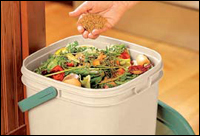Dear Umbra,
Can you tell me what is the best and most effective composter for a small urban backyard?
Joe
Baltimore, Md.
Dearest Joe,
Sort of. It’s ultimately a very personal choice, and one that depends on what you will try to compost and the amount of time you are willing to spend helping the compost along.
You may be familiar with the concepts of “aerobic” and “anaerobic” decomposition. Aerobic is better, and compost bins in this category will either be worm domiciles or will involve some version of constantly turning the compost to integrate oxygen into the mix. Folding air in allows helpful organisms to thrive and chow down on organic waste, thereby converting it to compost. Anaerobic bins have their own benefits, most notably the absence of work. You won’t have to turn your compost, but you’ll get a far inferior product (and a stronger odor).

What to do with these scraps?
Photo: Gardeners.com.
Worm bins are fairly simple, highly efficient, and great for food waste. They require a bit of work at the beginning, plus ongoing maintenance of proper worm habitat. The product they yield — vermicompost — is considered the highest quality food-based compost, and if you have kids around, it’s like a circus in a box. You can build your own bin out of wood, decorate it with elaborate murals depicting forest dryads, and put it fairly close to the kitchen door. Click here for just one example of instructions for building your own bin.
Once you’ve got your receptacle ready to go, soak dead leaves, shredded paper, and/or fine wood shavings in water, fill the bin with this damp material, and dump in the worms. (Not earthworms: red wiggler worms that you’ll get from a friend with a worm bin or order from a worm business.) Start off slowly, feeding the worms a bucket of food scraps each week until the population expands enough to handle all your food scraps. Worms head up the decomposition team, but they are aided by other important decomposers in the bin: mites, fungus, sow bugs, caterpillars, slugs, and so forth.
If you’re not up for becoming a worm farmer, other food composter choices run the gamut from a glorified bucket with holes to a hard plastic capsule on a spit. For example, you can buy a galvanized trash can, drill small holes in it for drainage, and bury the bottom about a foot below ground. Simply throw food in it until it fills up, then neglect it for 10 months or so. Presto: compost.
In my experience, folks find the best composter for their personality and forevermore extol it to their friends and neighbors as the acme of efficiency. Look around on Composters.com and you’ll get an idea of the range of products available.
Incidentally, if by compost you actually meant yard waste, not food scraps, a simple ring of chicken wire will do the trick. (I differentiate between the two kinds of waste, as it’s advisable to keep food scraps in a rat-resistant vessel.) But making good compost from yard waste requires learning a few key tricks and having the strength to operate a pitchfork. My space runneth out, but any decent used-book store will have a book on gardening and yard-waste composting.
Wiggly,
Umbra

